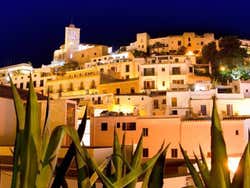
History of Ibiza
Read all about the history of Ibiza from the first Neolithic settlements to the tourist hotspot it is today.
During the Neolithic period, the recent Stone Age, Ibiza was a place of passage for sailors dedicated to trade and there is no evidence that it had a stable population.
Remains have been found that prove the island was inhabited during the Bronze Age. The first people who inhabited the island were of Iberian origin. Later, in 654 BC, the Phoenicians landed there, followed by a number of other civilisations throughout history.
The Foundation of Ibiza
Ibiza was founded by the Carthaginians. In 654 the Carthaginians founded the city of Ibosim, a strategic and commercial fortress as well as an excellent natural port for their ships, and they began to exploit the salt flats.
Remains of the Puig des Molins Necropolis and the Temple of Tanit from the Punics can be found on the island.
After the fall of Carthage in 146 BC and until 70 AD, Ibiza became a centre for pirates, which is why Rome decided to occupy it and in 70 AD it was incorporated into Hispania under the name of Ebusus.
In 426 Ebusus was devastated by the vandals of Genserico who incorporated it into his North African empire. In 554 it passed into Byzantine hands.
From 902 to 1229 Ibiza was under Muslim rule under the name of Yebisah. At the beginning of this domination, the island depended on the emirate of Cordoba and, later, on the Taifa kingdom of Denia, until in 1080 the Moorish kingdom of the Balearic Islands declared itself independent.
The island reached its economic peak in the 11th and 12th centuries.
In 1114 it was occupied by the troops of the Republic of Pisa and the Catalan troops of Count Ramon Barenguer III, with little success but a large booty, as they were forced to flee after the Muslims called for help from the Almoravids.
In 1235 Gillerm de Montgrí took the island for the Crown of Aragon with the approval of James I the Conqueror and expelled or enslaved the Muslim population, repopulating the island with people from Empordà, Barcelona and Tarragona.
King James II of Majorca granted Ibiza a municipal government that lasted until the 1454 Decrees of Sortition.
Ibiza throughout History
During the 16th and 17th centuries, a business and aristocratic class formed in Ibiza alongside another in the countryside that gradually became poorer due to plagues and droughts.
In 1522, the Germanic population of Majorca came to the city, and Ibiza suffered a period of endemic poverty, which was increased by the change of routes towards the Atlantic after the discoveries of 1492, attacks from the Turks in 1536 and the Great Plague of 1652.
After the War of the Spanish Succession between the Austrians and the Bourbons, King Philip V deprived Ibiza of the income from its salt flats, which had been exploited since the Carthaginian era, and abolished its governing bodies after the Nueva Planta Decree was passed.
Poverty on the island persisted throughout the 18th century, despite the increasing shipping activity due to the arrival of privateers and the important cultivation of almonds.
Clashes between the inhabitants of Ibiza Town and the peasantry grew and, in the early 19th century, social tension reached breaking point. The armed peasants went against the city, although they were defeated and tried in 1824. During the Restoration period, following more protests, many peasants were expelled from the island.
From 1868 onwards, when Ibiza received capital from Cuba and regular boat services were established on the mainland, a slow recovery began until the Civil War. During the Civil War, Ibiza suffered attacks from both sides with more human than material losses.
Ibiza Today
From 1960 onwards tourism began to increase exponentially in Ibiza, as in all the Balearic Islands. Ibiza became famous for its hippie movement and later for young tourism and clubbing, becoming the party capital of Europe.
Tourists have been drawn to Ibiza because of its beautiful beaches and pleasant climate. Tourism has brought great wealth to the island and constitutes its main source of income alongside construction.
Today Ibiza is still synonymous with partying and nightlife. It is home to some of the best nightclubs in the world, which is why many low-cost airlines offer trips from all over the continent throughout the summer season.

